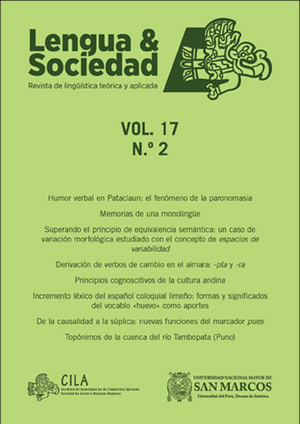Memories of a monolingual
DOI:
https://doi.org/10.15381/lengsoc.v17i2.22351Keywords:
bilingualism, Identity, minorities, generational order, antecedentAbstract
This article will address the linguistic situation of a Quechua-speaking speaker in the social field throughout its history. Within this framework, topics such as linguistic attitudes, bilingualism, identity, among others will be studied. Likewise, it will work with memories of other Quechua-speaking people, who have been important figures within the political and social framework of Peru. The investigation concludes that the microsocial evaluation of the documentation of the memories of Quechua-speaking persons is essential to subsequently have an overview of the Quechua situation and how it has been losing its prestige within the same group that speaks it.
References
Appel, R., & Muysken, P. (1996). Bilingüismo y contacto de lenguas. Barcelona: Ariel.
Betancourt, D. (2004). Memoria individual, memoria colectiva y memoria histórica: lo secreto y lo escondido en la narración y el recuerdo. Bogotá: UNP.
Degregori, C. (1986). Del mito de inkarri al mito del progreso: Poblaciones andinas, cultura e identidad nacional. Socialismo y participación, 36, 1-9.
Falcón, P. (2014). Las actitudes lingüísticas en bilingües amazónicos. Lengua y Sociedad, 7(2), pp. 123-131.
Falson, R. (1996). La sociolingüística de la sociedad. España: Visor Libros.
Gleich, Utta von. (1982). Die soziale und kommunikative Bedeutung des Quechua und Spanischen bei Zweisprachigen in Peru (1968-1978) (Tesis de doctorado). Universität Hamburg, Hamburg.
Gugenberger, Eva (1990). Migración y desplazamiento lingüístico en Arequipa. En Cerrón-Palomino, R. & Solís Fonseca, G. (eds.). Temas de lingüística amerindia. (pp. 181-191). Lima: Concytec/GTZ.
Hentschel, J. (2016). «En mí ya termina el quechua». Aproximaciones al uso lingüístico de hablantes bilingües (quechua-castellano) en el área urbana de Cochabamba, Bolivia. Indiana, 33(1), 7-9.
Hornberger, N. H., & Coronel-Molina, S. M. (2004). Quechua Language Shift, Maintenance, and Revitalization in the Andes: The Case for Language Planning. International Journal of the Sociology of Language, 167, 10-60. http://dx.doi.org/10.1515/ijsl.2004.025
Lovón, M. (2018). «Los hablantes del quechua y la vergüenza lingüística». Blog de Lenguaje y Redacción. Lima: PUCP. https://bit.ly/2sFTd30
Méndez, J. (2008). Memoria individual y memoria colectiva. ISSN, 22, 123-124.
Prats, J. (2010). Memoria Histórica y enseñanza de la Historia. Opinión, 3, 1-2.
Renker, Th. (2014). El uso del quechua en el Perú: Una investigación de identidad y performance cultural. Honors Theses and Capstones, 174. Recuperado de https://scholars.unh.edu/honors/174
Zavala, V., & Córdova, G. (2010). Decir y callar: Lenguaje, equidad y poder en la Universidad peruana. Lima: PUCP.
https://www.servindi.org/actualidad/101036
https://revistasinvestigacion.unmsm.edu.pe/index.php/anales/article/view/12428/11267
https://www.youtube.com/watch?v=s287wove7ei
https://www.youtube.com/watch?v=L4v1rHt0wtI
https://www.youtube.com/watch?v=fPD9Takcleo
Downloads
Published
Issue
Section
License
Copyright (c) 2018 Sintia Pilar Castro Tenorio

This work is licensed under a Creative Commons Attribution 4.0 International License.
AUTHORS RETAIN THEIR RIGHTS
a. Authors retain their trade mark rights and patent, and also on any process or procedure described in the article.
b. Authors can submit to the journal Lengua y Sociedad, papers disseminated as pre-print in repositories. This should be made known in the cover letter.
c. Authors retain their right to share, copy, distribute, perform and publicly communicate their article (eg, to place their article in an institutional repository or publish it in a book), with an acknowledgment of its initial publication in the journal Lengua y Sociedad.
d. Authors retain theirs right to make a subsequent publication of their work, to use the article or any part thereof (eg a compilation of his papers, lecture notes, thesis, or a book), always indicating its initial publication in the journal Lengua y Sociedad (the originator of the work, journal, volume, number and date).



























